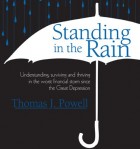There is growing intelligent dissent to the administration’s stimulus policy. Critics argue that recent growth is the result of market principles. Edward P. Lazear wrote Monday in the WSJ, that he forecasted a return to growth without stimulus spending. He goes on to argue, along with others, that housing programs have had questionable results. Lazear said that Uncle Sam is fibbing about job growth as well, reporting job retention as if it where job creation. John Irons of the Economic Policy Institute agrees. The administration has an incentive to report positive unemployment numbers- the most popular, but also misunderstood indicator.
Unemployment is only part of the overall picture. Other improving indicators reported this week tell us that the economy is turning around-but for whom? It depends on how you define growth. A technical definition says that growth is positive GDP. That means little to most people. Real growth, theoretically, is an improvement in living standards for the entire country. That’s why Main Street understands the unemployment rate. Accordingly, the media use it as the sole judge for growth. The problem is, as Lazear mentioned, job growth is the final component of recovery- behind financial stability and GDP growth. Unemployment lags years behind an actual recovery. If unemployment is a lagging indicator, Lazear cannot empirically link failed stimulus policy to persistent unemployment. He says that the administration is ignoring job losses while inflating job creation numbers. Isn’t he doing the same thing by ignoring market stabilization and GDP growth?
BEA Released GDP Data This Week
According to the BEA, GDP is up for a number of reasons. Look closely at the report. Exports rose 14 percent over last quarter and consumer spending rose 3.4 percent. Market Watch reported that positive numbers where in part due to stimulus spending, but as I argued in the past, these gains are only temporary. The purpose of the stimulus is to stabilize the economy so that private markets can function again. There is no wider conspiracy. The government will roll back stimulus as soon as it sees the return of private investment. There is evidence of this already: government spending actually slowed by 3.5 percent.
Not all the news was good. Personal income fell and prices rose. Hopefully this is a temporary trend based on slight price increases and high unemployment. However, as long as export growth remains positive, I see no need to fear 70s style stagflation.
Savings and Long-Term Growth
According to the old Solow Model, a country’s savings rate is positively related to long-term growth. Today, personal savings is around five percent, that’s up from around one percent just four years ago. This bodes well for long-term growth in the US. And now is a great time to invest. As private investment (including people’s savings) replaces public spending in the next few years, markets will rebound. Private investment will power an upswing in the business cycle, spark growth and reduce unemployment. The sooner the government rolls back stimulus, the better. In the mean time, citizens can take advantage of great opportunities in real estate and other deflated markets. This transfer of savings from a stock to a flow will jump-start the economy in way no stimulus could. It would take tens of trillions of dollars in government spending to match the power of private investors.
Thomas J. Powell







 With a bad habit of ignoring profound systemic problems, Federal Treasury officials are now securing a system that encourages the same careless risk-taking that originally got us into this mess. With this week marking the one-year anniversary since Lehman Brothers imploded, it is only appropriate to discuss the faulty system that protects and rewards failing financial institutions.
With a bad habit of ignoring profound systemic problems, Federal Treasury officials are now securing a system that encourages the same careless risk-taking that originally got us into this mess. With this week marking the one-year anniversary since Lehman Brothers imploded, it is only appropriate to discuss the faulty system that protects and rewards failing financial institutions.